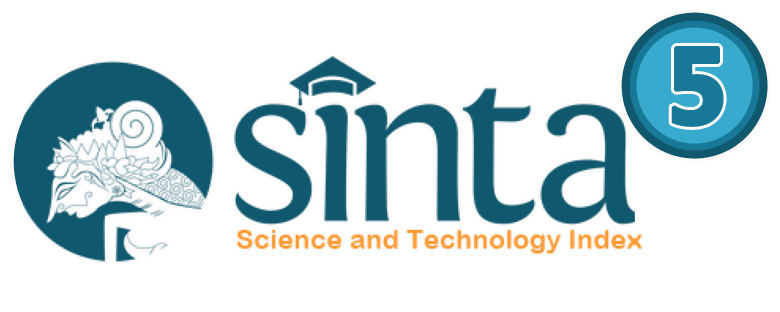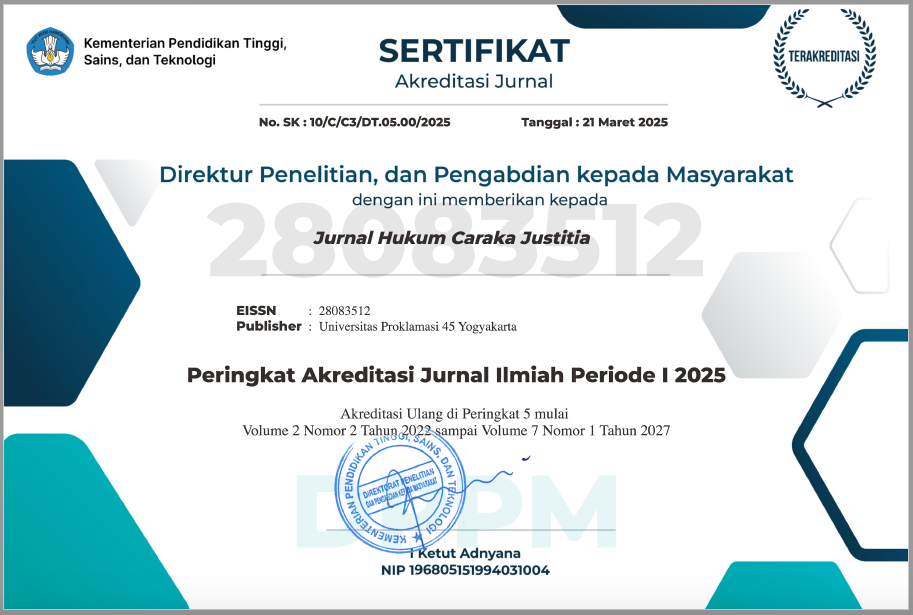Posisi Agama dalam Konstruksi Negara Republik Indonesia Berdasarkan Pancasila dan UUD 1945
DOI:
https://doi.org/10.30588/jhcj.v1i2.920Keywords:
Position, Religion, Country, PancasilaAbstract
This paper discusses the position of religion and the implementation of its teachings in the construction of the Republic of Indonesia based on Pancasila and the 1945 Constitution. Pancasila as the fundamental basis for the Republic of Indonesia makes the principle of 'Ketuhanan Yang Maha Esa' or translated as 'belief in the one and only God' as the main basis that animates the other four principles. As a consequence, the Republic of Indonesia must accept and put the values of the belief in the one and only God which is expressed in religious teachings, in all activities of the society, both in the private and in the public-country domain.
In the private sphere, the state guarantees and protects citizens to embrace religion and worship based on religious teachings and beliefs. In the public sphere, the country gives an important religious position by placing religious values as the material source of all positive legal rules and as the ethical and moral foundation in the life of the nation and country hood. Also, the country must accommodate openly, freely, fairly, and in balance with religious-patterned aspirations to take part in country politics through social organizations and political parties. Religion does not integrate (fusion) into the country, but also the country does not separate from religion.
References
Artikel Jurnal
Fokky, Fuad. “Islam dan Ideologi Pancasila, Sebuah Dialektika”. Lex Jurnalica 9, no. 3 (Desember 2012): 64-170.
Shaleh, Ali Ismail, Fifiana Wisnaeni. “Hubungan Agama dan Negara Menurut Pancasila dan Undang-Undang Dasar Negara Republik Indonesia Tahun 1945”. Jurnal Pembangunan Hukum Indonesia 1, no. 2, (2019): 237-249.
Zoelva, Hamdan. “Relasi Islam, negara, dan Pancasila Dalam Perspektif Tata Hukum Indonesia, de Jure”. Jurnal Syariah dan Hukum 4, no. 2 (Desember 2012): 99-112.
Buku
Ali, As’ad Said. Negara Pancasila. Jakarta: LP3ES. 2010.
Ali, Muhammad Daud. Pengantar Ilmu Hukum dan Tata Hukum Islam di Indonesia. Jakarta: Rajawali Press, 2009.
Azhary, Tahir. Negara Hukum Suatu Studi Tentang Prinsip-Prinsipnya Dilihat dari Segi Hukum Islam, Implementasinya pada Periode Negara Madinah dan Masa Kini, Cet.1. Bogor: Kencana, 2003.
Bahar, Saafrudin, et al. Risalah sidang Badan Penyelidik Usaha-usaha Persiapan Kemerdekaan Indonesia (BPUPKI), Panitia Persiapan Kemerdekaan Indonesia. Jakarta: Sekretariat Negara Republik Indonesia, 1995.
Effendy, Bahtiar. Islam dan Negara : Transformasi Pemikiran dan Praktik Politik Islam di Indonesia. Jakarta: Paramadina, 1998.
Gani, Roeslan Abdul. Sejarah Perkembangan Islam di Indonesia. Jakarta: Antar Kota, 1983.
Kaelan. Negara Kebangsaan Pancasila, Kultural, Historis, Filosofis, Yuridis dan Aktualisasinya. Yogyakarta: Paradigma, 2013.
Karim, M. Abdul. Menggali Muatan Pancasila Dalam Perspektif Islam. Yogyakarta: Surya Rara bekerja sama dengan Sunan Kalijaga Press, 2004.
Kusuma, Ananda B. Lahirnya Undang-Undang Dasar 1945: Memuat Salinan Dokumen Otentik Badan Oentoek Menyelidiki Oesaha² Persiapan Kemerdekaan. Jakarta: Badan Penerbit Fakultas Hukum Universitas Indonesia, 2004.
Latif, Yudi. Negara Paripurna, Historisitas, rasionalitas, dan Aktualitas Pancasila. Jakarta: PT. Gramedia Pustaka Utama. 2011.
Nasution, Adnan Buyung. Aspirasi Pemerintahan Konstitusional di Indonesia. Jakarta: Grafiti. 1995.
Natsir, Mohammad. Arti Agama dalam Negara, dalam Mohammad Natsir, Capita Selecta. Jakarta: Bulan Bintang, 1973.
Downloads
Published
How to Cite
Issue
Section
License
Copyright (c) 2021 Sukirno Sukirno

This work is licensed under a Creative Commons Attribution 4.0 International License.
Authors who publish with JHCJ agree to the following terms:
Authors retain copyright and grant the JHCJ right of first publication with the work simultaneously licensed under a Creative Commons Attribution 4.0 International License that allows others to share (copy and redistribute the material in any medium or format) and adapt (remix, transform, and build upon the material) the work for any purpose, even commercially with an acknowledgment of the work's authorship and initial publication in JHCJ.
Authors are able to enter into separate, additional contractual arrangements for the non-exclusive distribution of the journal's published version of the work (e.g., post it to an institutional repository or publish it in a book), with an acknowledgment of its initial publication in JHCJ. Authors are permitted and encouraged to post their work online (e.g., in institutional repositories or on their website) prior to and during the submission process, as it can lead to productive exchanges, as well as earlier and greater citation of published work (See The Effect of Open Access).














